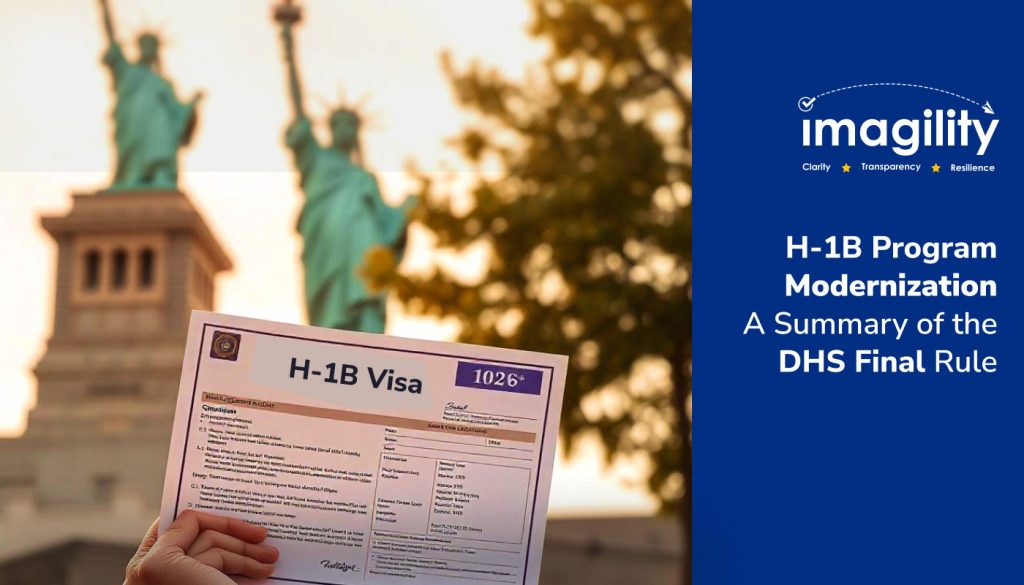Introduction
On December 17, 2024, the U.S. Department of Homeland Security (DHS) issued a final rule to modernize the H-1B specialty occupation worker program. The rule introduces significant updates It will take effect on January 17, 2025.
The goal of this rulemaking is to modernize and enhance the H-1B program by:
- Clarifying program requirements and increasing efficiency.
- Offering greater benefits and flexibility to both petitioners and beneficiaries.
- Strengthening measures to ensure program integrity.
Key Updates on H-1B Registration Rules
- Beneficiary-Centric H-1B Selection Process: Under the previous system, multiple registrations for the same individual could increase their chances of selection. The new process allows each unique beneficiary to be entered into the selection pool only once, regardless of the number of registrations submitted on their behalf. This change promotes fairness, ensures equal selection opportunities for all beneficiaries, and deters attempts to manipulate the system through multiple registrations.
- Prohibition on Multiple Registrations by Related Entities: Related entities are now explicitly prohibited from submitting multiple registrations for the same beneficiary. This measure aims to prevent any attempts to unfairly enhance the chances of selection.
- Authority to Deny or Revoke Petitions: The Department of Homeland Security (DHS) has formalized its authority to deny or revoke H-1B petitions if the associated registration contains false information or is otherwise invalid. This includes situations where the registration fee is declined, disputed, or considered invalid after submission.
- Compliance with Site Visits: The new rule clarifies that failure to comply with site visits may lead to the denial or revocation of the petition. This reinforces the importance of compliance and oversight within the program.
Clarification of H-1B Eligibility & Requirements
Specialty Occupation criteria revised – Petitioner may accept a range of qualifying degree fields as sufficient to qualify for the position. However, there must be a direct relationship between the required degree field(s) and the duties of the position, ensuring that only qualified individuals are eligible. “Direct relationship” means there must be a logical connection between the degrees or its equivalent and the duties of the position.
Detailed Itinerary eliminated – The new changes eliminate the requirement to provide an itinerary detailing specific day-to-day assignments for the entire duration requested in an H-1B specialty occupation petition.
Eligibility of Beneficiary-Owners: The new changes permit employers with a controlling interest (defined as owning more than 50% of the petitioner or holding majority voting rights) in the entity to self-petition, provided specific criteria are met. For example, USCIS will limit the validity of the initial H-1B petition and the first extension to 18 months each.
Strengthening H-1B Program Integrity
DHS is enhancing the integrity of the H-1B program through this rulemaking by:
- Requiring petitioners to demonstrate that a bona fide position in a specialty occupation is available for the beneficiary as of the requested start date.
- Codifying its authority to request contracts or similar evidence to verify the authenticity of the position.
- Ensuring the Labor Condition Application (LCA) aligns with and properly supports the petition.
- Revising the definition of a “United States employer” to codify existing policy, requiring petitioners to have a bona fide job offer for the beneficiary to begin work in the U.S. as of the requested start date.
- Adding a requirement for petitioners to have a legal presence and be subject to service of process within the United States.
Benefits and Flexibilities for H-1B Cap-Exempt Employers and Workers
- Expanded Exemptions for Nonprofit and Governmental Entities: The Department of Homeland Security (DHS) has broadened certain exemptions to the H-1B cap for specific nonprofit organizations and governmental research institutions. This expansion also applies to beneficiaries who are not directly employed by a qualifying organization.
- Cap Gap Extension for F-1 Students Transitioning to H-1B: Flexibilities have been enhanced for F-1 students aiming to change their status to H-1B. This includes automatic extensions of F-1 status and employment authorization until April 1 of the relevant fiscal year, helping to prevent any disruptions during the transition process.
- Start Date Flexibility for H-1B Cap Cases: The final rule provides greater flexibility regarding employment start dates for H-1B cap-subject petitions. Employers can now file petitions with requested start dates beyond October 1 of the relevant fiscal year, aligning with current DHS policy and offering more convenience for both employers and beneficiaries.
Other DHS Updates
- Codification of Deference Policy: DHS is codifying its existing deference policy to clarify that, when adjudicating a Form I-129, Petition for Non-immigrant Worker, involving the same parties and underlying facts, adjudicators should generally defer to a prior USCIS determination of eligibility. Exceptions apply if a material error is identified in the prior approval or if new information or significant changes affect the eligibility of the petitioner, beneficiary, or applicant.
- Extensions & Amendments: DHS is updating the regulations to explicitly require that petitions for extensions or amendments of stay include evidence demonstrating the beneficiary’s maintenance of status.
Contact Us for more information
sales@imagility.co
617-865-8444









